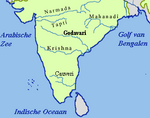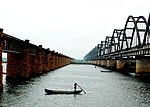Gondia district
This article needs additional citations for verification. (June 2019) |
Gondia district | ||
|---|---|---|
Tehsils 1. Gondia, 2. Goregaon, 3. Tirora, 4. Arjuni Morgaon, 5. Deori, 6. Amgaon, 7. Salekasa, 8. Sadak Arjuni | | |
| Government | ||
| • Body | Gondia Zilla Parishad | |
| • Guardian Minister | Aatram Dharamraobaba Bhagwantrao (Cabinet Minister) | |
| • President Zilla Parishad | Pankaj Rahangdale | |
| • District collector | Nayana A. Gunde (IAS) | |
| • CEO Zilla Parishad | Anil Patil (IAS) | |
| • MPs |
| |
| Area | ||
| • Total | 5,234 km2 (2,021 sq mi) | |
| Population (2011) | ||
| • Total | 1,322,507 | |
| • Density | 250/km2 (650/sq mi) | |
| • | ||
| Average annual precipitation | 1197 mm | |
| Website | gondia | |
Gondia district (also known as Gondiya, Marathi pronunciation:
Geography
Climate

Gondia experiences extreme variations in temperature with very hot summers and very cold winters and has an average relative humidity of 62 per cent. Average recorded rainfall is more than 1,200 mm (47 in) in each rainy season (June to September).
The hottest month is May when daytime high temperatures will generally average 42 °C (108 °F). During the same month, nightly minimum temperatures average around 28 °C (82 °F). In recent times the highest-recorded temperature in May has been 48 °C (118 °F), and the lowest May temperature has been 20 °C (68 °F).
The coolest months are December and January when temperatures will reach highs of around 29 °C (84 °F) and lows of 13 °C (55 °F). The highest-recorded temperature in January was 38 °C (100 °F) and the lowest was 0 °C (32 °F).
| Climate data for Gondia | |||||||||||||
|---|---|---|---|---|---|---|---|---|---|---|---|---|---|
| Month | Jan | Feb | Mar | Apr | May | Jun | Jul | Aug | Sep | Oct | Nov | Dec | Year |
| Mean daily maximum °C (°F) | 27.6 (81.7) |
31.1 (88.0) |
35.2 (95.4) |
43.0 (109.4) |
47.0 (116.6) |
45.0 (113.0) |
30.5 (86.9) |
29.9 (85.8) |
30.8 (87.4) |
31.0 (87.8) |
29.3 (84.7) |
27.9 (82.2) |
34.0 (93.2) |
| Mean daily minimum °C (°F) | 13.3 (55.9) |
15.4 (59.7) |
19.6 (67.3) |
24.6 (76.3) |
28.9 (84.0) |
27.4 (81.3) |
24.3 (75.7) |
24.1 (75.4) |
23.9 (75.0) |
21.2 (70.2) |
15.2 (59.4) |
9 (48) |
20.6 (69.0) |
| Average precipitation mm (inches) | 18.0 (0.71) |
30.7 (1.21) |
16.0 (0.63) |
16.0 (0.63) |
13.7 (0.54) |
219.2 (8.63) |
503.9 (19.84) |
443.5 (17.46) |
222.3 (8.75) |
66.5 (2.62) |
22.9 (0.90) |
5.8 (0.23) |
1,578.5 (62.15) |
| Source: Government of Maharashtra | |||||||||||||
Demographics
| Year | Pop. | ±% p.a. |
|---|---|---|
| 1901 | 313,952 | — |
| 1911 | 366,186 | +1.55% |
| 1921 | 383,135 | +0.45% |
| 1931 | 440,170 | +1.40% |
| 1941 | 514,165 | +1.57% |
| 1951 | 572,142 | +1.07% |
| 1961 | 678,740 | +1.72% |
| 1971 | 854,527 | +2.33% |
| 1981 | 987,089 | +1.45% |
| 1991 | 1,086,221 | +0.96% |
| 2001 | 1,200,707 | +1.01% |
| 2011 | 1,322,507 | +0.97% |
| source:[2] | ||
According to the
Languages
At the time of the
Government and politics
Members of Parliament
Guardian Minister
- Rajkumar Badole served from 31 October 2014 - 8 November 2019
- Anil Deshmukh served from 9 January 2020 - 5 April 2021
- Nawab Malik| served from 5 April 2021 - 27 March 2022
- Prajakt Tanpure served from 27 March 2022 - 29 June 2022
- Sudhir Mungantiwar served from 27 September 2022 - 4 October 2023
District magistrate/collector
Nayana A. Gunde is the district magistrate of Gondia since 2019.
Divisions
The district is divided into four sub-divisions, each of which is further divided into
- Gondia sub-division: Gondia.
- Deori: Deori, Amgaon, and Salekasa talukas
- Tirora sub-division: Tirora and Goregaon talukas
- Arjuni Morgaon sub-division: Arjuni Morgaon and Sadak Arjuni talukas
The district also includes of 556
The district has four
Economy
In 2006 the
References
- ^ "Census GIS India". Archived from the original on 3 July 2007. Retrieved 4 October 2019.
- ^ "Census of India Website : Office of the Registrar General & Census Commissioner, India". www.censusindia.gov.in. Retrieved 11 January 2020.
- ^ "Population by Religion - Maharashtra". censusindia.gov.in. Registrar General and Census Commissioner of India. 2011.
- ^ a b c d e f "District Census Hand Book – Gondiya" (PDF). Census of India. Registrar General and Census Commissioner of India.
- ^ US Directorate of Intelligence. "Country Comparison:Population". Archived from the original on 27 September 2011. Retrieved 1 October 2011.
Mauritius 1,303,717 July 2011 est.
- ^ "2010 Resident Population Data". U. S. Census Bureau. Archived from the original on 21 July 2011. Retrieved 30 September 2011.
New Hampshire 1,316,470
- ^ a b "Table C-16 Population by Mother Tongue: Maharashtra". censusindia.gov.in. Registrar General and Census Commissioner of India.
- ^ "Districtwise List of Assembly and Parliamentary Constituencies". Chief Electoral Officer, Maharashtra website. Archived from the original on 18 March 2010. Retrieved 31 March 2009.
- ^ a b Ministry of Panchayati Raj (8 September 2009). "A Note on the Backward Regions Grant Fund Programme" (PDF). National Institute of Rural Development. Archived from the original (PDF) on 5 April 2012. Retrieved 27 September 2011.




